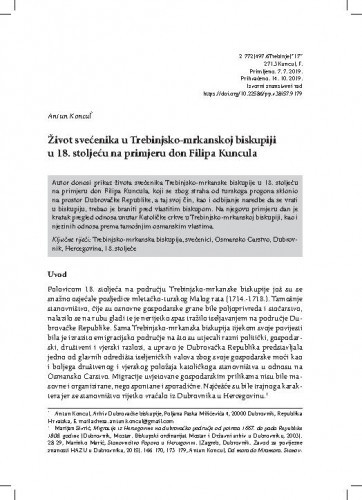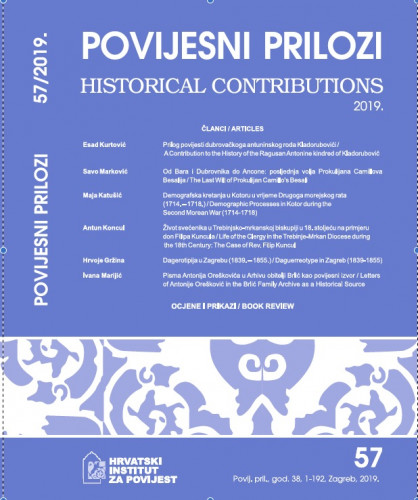Članak donosi prikaz života svećenika Trebinjsko-mrkanske biskupije u 18. stoljeću na primjeru don Filipa Kuncula, koji se zbog straha od turskoga progona sklonio na prostor Dubrovačke Republike, a taj svoj čin, kao i odbijanje naredbe da se vrati u biskupiju, trebao je braniti pred vlastitim biskupom. Na njegovu primjeru dan je kratak pregled odnosa unutar Katoličke crkve u Trebinjsko-mrkanskoj biskupiji, kao i njezinih odnosa prema tamošnjim osmanskim vlastima.; This paper presents the life of the Catholic clergy in the Trebinje-Mrkan diocese during the 18th century on the example of Don Filip Kuncul (1726-1771), who fled the diocese to the Republic of Dubrovnik in fear of Turkish persecution. As he refused to return to his office, he had to defend his case before his bishop. His example reveals two features of life in the area of the Trebinje-Mrkan diocese during this period. Owing to its position at the frontier between the Ottoman Empire, the Republic of Dubrovnik, and the Venetian Republic, this diocese was characterized by a high emigration rate, as the population often fled to the Republic of Dubrovnik for various political, economic, social, and religious reasons. At the same time, the bishops of Trebinje-Mrkan, settled in Dubrovnik, lamented the lack of priests throughout the 18th century as one of the diocese’s gravest ailments, actively seeking to secure a sufficient number of priests to serve there. These features are well exemplified by Don Filip’s life. Due to his parents’ poverty, he was sent to serve in Dubrovnik as a boy. The then bishop of Trebinje-Mrkan, Sigismund Tudisi (1692-1760), contacted him at that time, persuaded him to receive the priestly orders, and then sent him to serve in his native parish of Gradac. However, his service at the parish was short-lived, only four years, because he incurred the wrath of the Ottoman authorities by helping in the transfer of a pregnant woman to the Republic of Dubrovnik and was forced to flee there himself. Due to his leaving the parish and his refusal to return to his post, Don Filip had to defend himself before Bishop Tudisi, who threatened him with excommunication. Finally, Don Filip sought and received protection in Rome from the Congregation for the Doctrine of the Faith, and never returned to active service in the Trebinje diocese.
Sažetak

 Povijesni prilozi : Historical contributions : 38,57(2019) / Hrvatski institut za povijest ; glavna i odgovorna urednica, Chefredacteur, editor-in-chief Irena Benyovsky Latin.
Povijesni prilozi : Historical contributions : 38,57(2019) / Hrvatski institut za povijest ; glavna i odgovorna urednica, Chefredacteur, editor-in-chief Irena Benyovsky Latin.